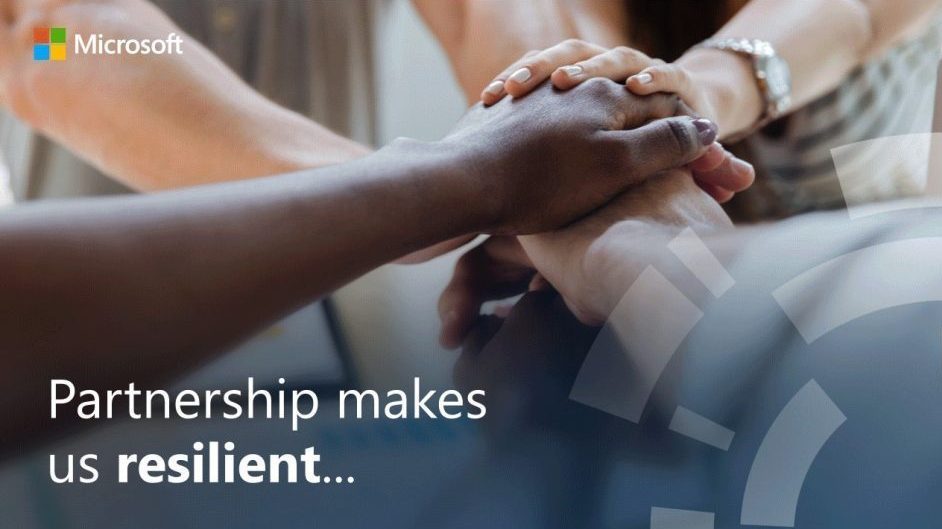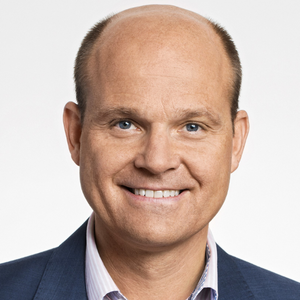
Over the decades I’ve seen the people of Central and Eastern Europe (CEE) constantly rise to the occasion, turning the unexpected into unprecedented advances, even breakthroughs. It’s a mindset that has given wings to the region’s incredible entrepreneurial spirit – embodied by the rise of world-beating firms like Skype and UiPath.
Digital technology has become a powerful enabler of progress, and the wave of digital innovation across the region shows no sign of slowing down. Quite the opposite.
We’re living through a difficult and uncertain period, marked by major economic, societal and technological changes. Experience of similar times past has taught us the importance of building institutions that are as resilient and responsive as the people of the region. The systems and infrastructure that underpin CEE economies have rapidly advanced, but more remains to be done to achieve the strength and stability needed to weather even the toughest storms. It’s both a challenge and opportunity, and to accelerate progress it’s vital we work and learn together.

Reflecting on three decades of Microsoft’s presence in and contribution to the region, I realize just how much partnership has shaped it. And it has never been more needed – or more valuable – than it is today.
So I wanted to share my tribute to the people of CEE and the power of partnership.
Partners: Backbone of the innovation economy
The ICT industry is a major driver of economic growth and innovation. It directly contributes more than 4% to the region’s GDP. Millions of workers are employed by tech firms of all types and sizes, from software developers and service providers to IT consultants and systems integrators.
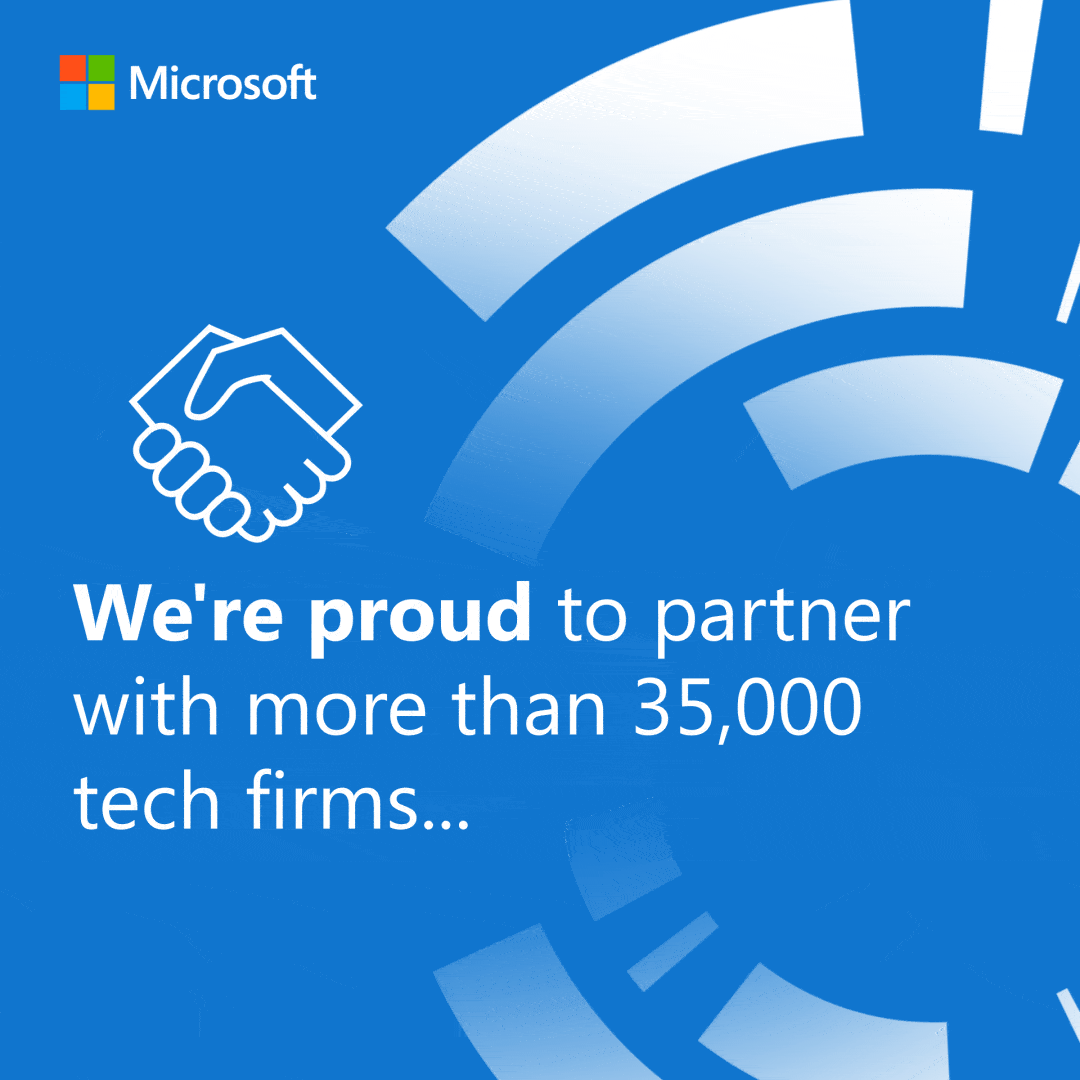 We’re proud to partner with more than 35,000 of these firms, many of whom we’ve supported at every step from early-stage start-up to scaling up to become world-class operations.
We’re proud to partner with more than 35,000 of these firms, many of whom we’ve supported at every step from early-stage start-up to scaling up to become world-class operations.
Together, we’ve helped build the backbone to the innovation economy here in CEE. Our partners play a vital role in educating local businesses and public sector organizations on digitization and how it can help them grow, scale and be more productive, and how to use cloud and AI to innovate in ways they may never have considered.
Sharing our combined insights, know-how and guidance with leaders will help them continue to make informed choices and the right digital investments so they can achieve ‘more with less’ today whilst laying the foundations for a stronger & more sustainable future.
Governments: The digital catalysts
Across CEE, the digitization of public sector organizations and the services we all rely on has gone from strength to strength.
Malta and Estonia are seen globally as leaders in digital public services, and are ranked #1 and #2 in Europe for eGovernment by the European Commission. Their digital governments are the most user-centric, transparent, technologically enabled and open to users from other European countries.
Key to Malta’s success has been the agile cloud-first strategy developed by MITA, a central IT agency which supports every branch of government. New services can be quickly and securely rolled out – increasing efficiency for government and convenience for citizens. Importantly, MITA has long been committed to security, including building state-of-the-art Security Operations Centre. An exceptional approach that many countries could learn from.
Why does it matter?
The public sector isn’t just an element in the story of CEE’s digital transformation. It is a major catalyst that fuels innovation across the broader economy and encourages greater digital participation amongst citizens.
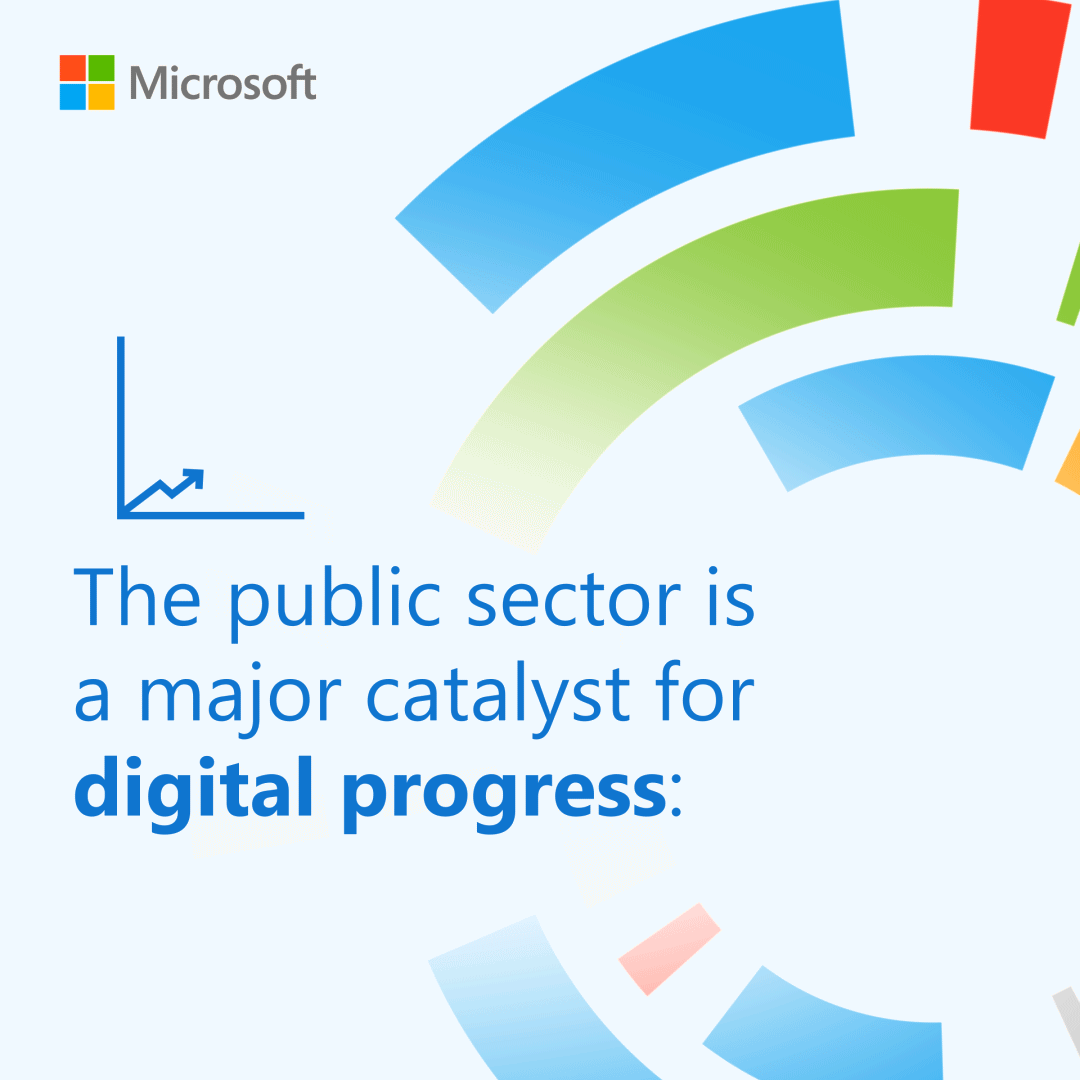 We’re proud to partner with governments across CEE to advance digital progress. Over the past two years, working hand-in-hand with national governments, we announced two significant investment plans to accelerate digital innovation and transformation in Poland and Greece. These plans include building three new datacenters in Poland and three in Greece, plugging both countries into the world’s largest cloud infrastructure network and delivering access to enterprise-grade cloud services to every business, organization, entrepreneur and innovator in the market.
We’re proud to partner with governments across CEE to advance digital progress. Over the past two years, working hand-in-hand with national governments, we announced two significant investment plans to accelerate digital innovation and transformation in Poland and Greece. These plans include building three new datacenters in Poland and three in Greece, plugging both countries into the world’s largest cloud infrastructure network and delivering access to enterprise-grade cloud services to every business, organization, entrepreneur and innovator in the market.
Talent: Digital greenhouse
CEE countries outperform ‘digital frontrunners’ in Western Europe on many talent-related measures – Malta has more developers per citizen; a greater percentage of students graduate in science, tech and math subjects in Greece and ICT in Serbia; Estonia’s workforce has a higher concentration of ICT specialists, and so the list goes on.
This same talent is helping advance Microsoft’s own innovation.
We have built four engineering and development centers here in the region. These have been creating exactly the kind of value-added job opportunities that are critical to helping accelerate the structural transition of the economy, grow the digital capabilities of local talent and fuel home-grown innovation.
With its strong pipeline of tech talent, it is vital that CEE continues to bring more IT professionals into established businesses. In parallel, continuous upskilling is needed, so they meet fast changing and new demands and act as agents of change across the economy. The Digital Futures Index clearly showed that countries with more ICT specialists in the workforce are more productive and innovative.
Which is why, when we announced the investment plans I mentioned earlier, we committed to digitally upskill 150,000 people in Poland and 100,000 in Greece, with an emphasis on technical certification – a goal we have already exceeded in Poland.
Non-profits: Opportunities for everyone
Non-profit organizations play a critical role in every country, helping advance inclusive, democratic, and sustainable societies.
We have supported more than 27,000 non-profits in CEE with software and other donations to the value of $440 million in the past 15 years alone.
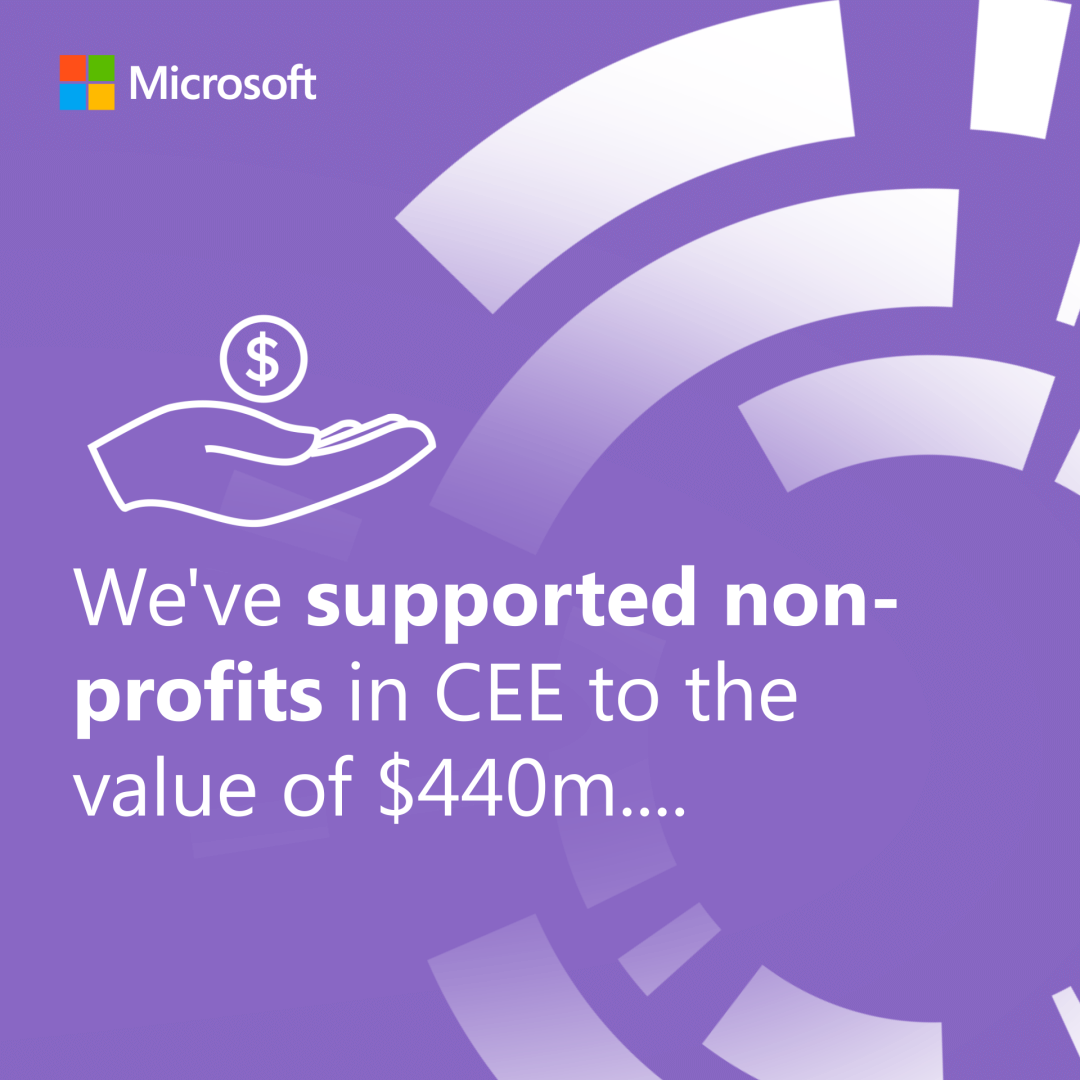 I’m particularly proud of the work we do with underserved communities. In partnership with NGOs across CEE, we have trained more than a quarter of a million underprivileged people over the past two years. The technology skills we teach provide the springboard to new jobs and new careers. Almost 20,000 have gained in-demand industry certifications, and we have trained over 9,000 new trainers to help scale support to more people.
I’m particularly proud of the work we do with underserved communities. In partnership with NGOs across CEE, we have trained more than a quarter of a million underprivileged people over the past two years. The technology skills we teach provide the springboard to new jobs and new careers. Almost 20,000 have gained in-demand industry certifications, and we have trained over 9,000 new trainers to help scale support to more people.
55% of beneficiaries from our non-profit programs have been women. I’m inspired by partners like
Aj ty v IT, a Slovakian organization which helps women on maternity leave advance their IT skills, and the Krakow-based Kosciuszko Institute which is helping Polish and Ukrainian women gain cybersecurity skills.
We believe digital progress must be inclusive of people of all abilities, backgrounds, and circumstances. As our recent Digital Futures Index revealed, inclusivity significantly boosts the positive quality-of-life impact a country’s digital development can have.
Local developers play a key role in helping to make our digital technology more inclusive. One fantastic example is the engineering team in our development center in Prague that serves as a Center of Excellence for Accessibility design in collaboration tools. In partnership with a local association representing people with visual impairments, whose members share candid feedback about what works – and what doesn’t – for them, they make sure everyone can comfortably and efficiently use Teams.
When I look back over the past three decades, I see the tremendous progress we’ve made, with more people than ever before participating in and benefiting from a world that is increasingly digital-by-default.
Business: Platform to grow
As our customers’ needs have evolved, so too has our business.
We’ve gone on a journey of reinvention from software vendor to digital transformation partner and cloud innovation platform. At the heart of everything we do is empowering our customers to be successful. It means giving them the tools and skills they need to innovate and build for the future.
They’re the experts in their business, and they are the real innovation owners. Our job is to anticipate and respond to their needs. Such as providing industry-specific cloud services that enable customers to make quicker data-driven decisions and generate business value faster, for example. Or bringing data together in our Cloud for Sustainability to deliver insights to help customers manage their sustainability efforts and accelerate action.
All of which creates a much deeper relationship – a true partnership. I’m again and again thrilled to see customers like UiPath, Rimac, Infobip, Packeta, FintechOS and Zabka – to name a few – grow into truly world-class businesses.
Partnership to help our customers unlock more value with less (resources, energy, budgets), reinvent themselves, and find new ways to make an impact.
Together turning uncertainty into possibility
Much has changed over the last three decades, but one thing has remained constant: our commitment to helping every person, every organization in CEE to achieve more.
No doubt the next 30 years, even three years… or months, will see more and faster change. But Microsoft will always remain a true partner for the region, working together to help turn uncertainty into possibility.
To paraphrase Satya Nadella, with great opportunity comes great responsibility. We have an obligation to ensure our innovation is driven by what the world and our customers need, and in doing so, maximise the full potential of technology to fuel growth and empower positive change.
Source: From unexpected to unprecedented: Success is a team sport | LinkedIn


